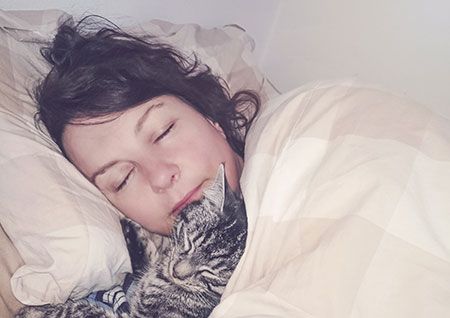How to turn off your feline alarm clock
Veterinary team members! Know cat owners who regularly suffer 4 a.m. wakeup calls of cat paws to the face? (Or are you that cat owner?) Well, rest easy. Solutions are out there.

Yes, this really could be you one day. (Or at least your cat-owning veterinary clients.) (Patrizia Tilly/stock.adobe.com)
Nighttime waking is a problem that veterinary behaviorist Julia Albright, MA, DVM, DACVB, experienced firsthand with one of her cats. And it's serious. If a cat keeps a veterinary client awake, that can very quickly lead to euthanasia or rehoming of a pet.
The issue is, of course, that cats' sleep cycles are set to “when their prey is awake, at dawn and dusk,” Dr. Albright told Fetch dvm360 attendees in her feline behavior session. Thus, some cats are awake and ready to hunt and eat when your cat-loving clients are hours from their wakeup alarm.
Before looking for a behavioral fix, if a cat suddenly exhibits nighttime waking, check for underlying medical issues (for example, pain or a metabolic condition).
“Psychoactive medications, deterrents and sound-blocking tools may be helpful tools for households,” Dr. Albright explains in her session proceedings. “Factors such as age-related cognitive decline can be addressed with additional medications.”
Cat exercise? Be realistic
If cats need more regular exercise to help adjust their sleep schedule, behaviorist Dr. Julia Albright gives realistic recommendations in her discharge notes and exam-room recommendations to cat owners.
“Work it into their daily life, instead of 30 minutes a day. That's just not gonna happen.”
Dr. Albright often starts with two-minute exercise breaks three times a day.
Barring physiological problems, one likely culprit is the cat's circadian rhythm. One solution is to try to adjust the cat's sleep cycle by setting regular times in the morning or evening to exercise and feed the cat. “[The right times] will vary from cat to cat,” Dr. Albright says, so the veterinary client will need to experiment at home.
She also recommends that vet teams make sure clients understand that providing food or attention at particular times positively reinforces the attention-seeking behavior. If cat owners play with the cat or get up and feed the cat at the wrong times, it'll show in the cat's behavior.
“If they sometimes find something on the ledge and sometimes get access to the garbage, they'll keep doing it,” Dr. Albright says, explaining that inconsistent “variable ratio” is a powerful motivator. “When [the cat never knows] when it's coming, that is a very successful way to maintain a behavior. If they're successful once every 500 times, that's enough.”
The other solution for adjusting feeding times is a technological one, she says, which worked for her and her husband.
“Our cat would scream in our faces from 4 a.m. to 6 a.m., so I uncoupled us from feeding him,” she says. She installed an automatic food dispenser (for example, one like the PortionPro Rx or a similar feeder from pet retailers).
“Now he goes and yells at the food dispenser in the basement,” Dr. Albright says. Problem solved!